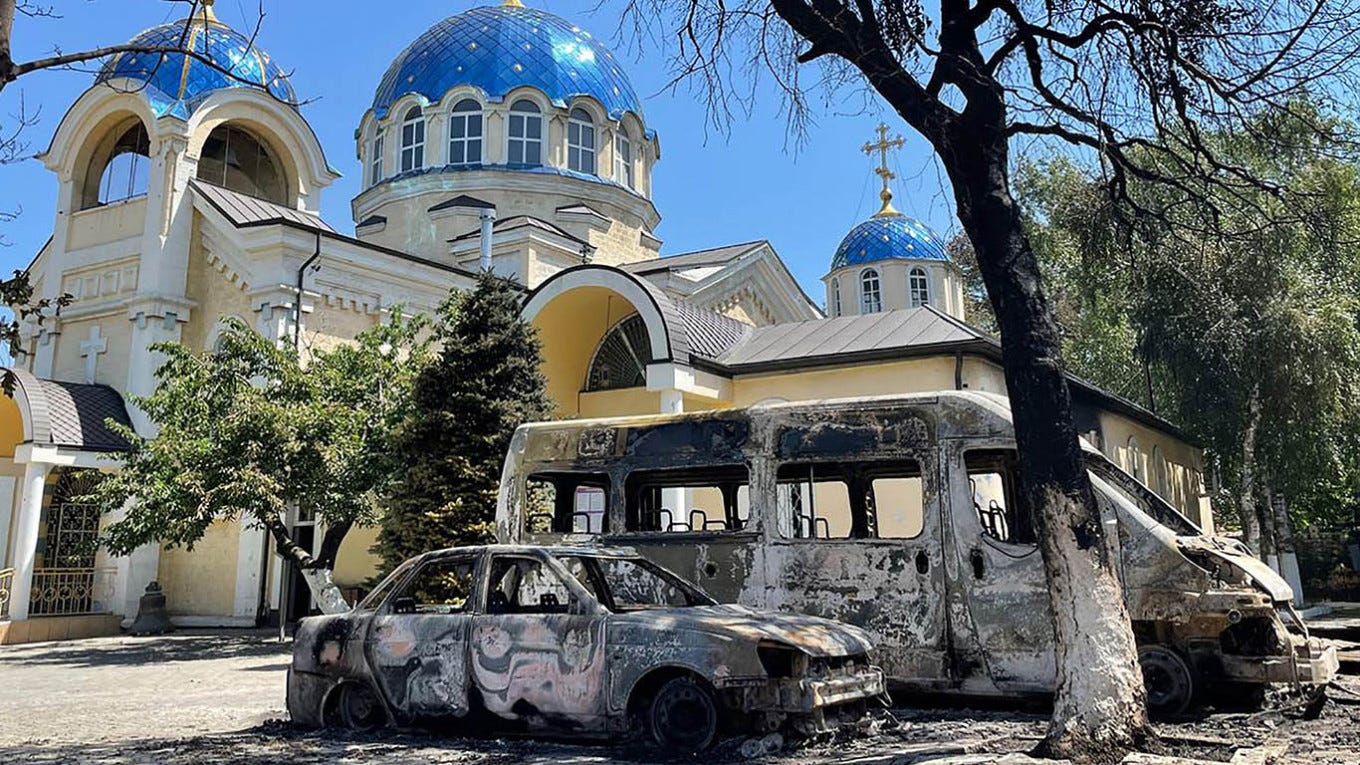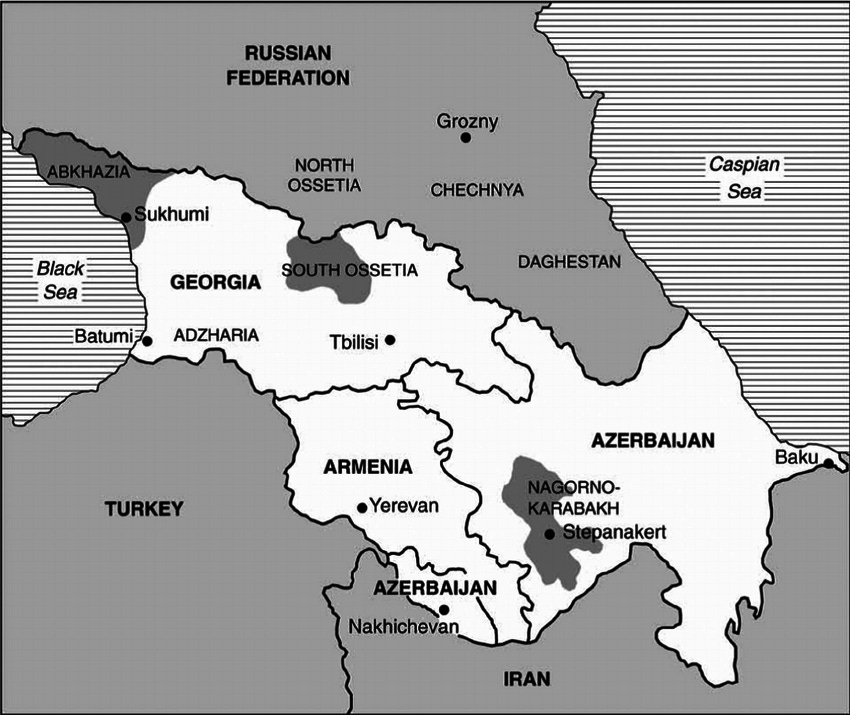Eurasia note #96 Stirring Trouble In Russia’s Backyard
Bombs and terror, as 170 year-old policy continues
Dagestan synagogues and churches attacked in capital and coastal city
Sebastopol beach goers killed by U.S. made ATACMS cluster bombs
Abkhazia border crossing into Russia struck by gunmen
Conflicts, like wildfires, flare in places where globalists eye resources
Brzezinski's policy of ‘decentralising’ Russia is promoted openly
Proxies widen the war to new fronts
Without Russia as a buffer, Europe would not exist in its current form
It has been invaded dozens of times - more than most countries
EU leaders who call for breaking it up, should think twice
See also:
Eurasia note #86: Russian Activist Alexei Navalny Dies, Cui Bono? - Some think his death unnatural, as the West drums for war (Feb 16, 2024)
Eurasia Note #83 - Tragedy As Armenians Flee Karabakh -Yerevan yields Artsakh to Azerbaijan, Russia stands aside (Sep 26, 2023)
Eurasia Note #7 Afghan Squid - Turmoil Disguises Motives and Tentacles (Aug 28, 2021)
(2,000 words or about 10 minutes of your company.)
Tbilisi, Jun 24, 2024
A series of attacks in and around Russia suggest an effort to inflame the region, connected to the war in Ukraine.
The U.S. missile that killed beach goers near the port of Sebastopol may have been struck by flak, but attacks in Abkhazia and Dagestan were no coincidence.
Events suggests that outsiders are trying to stir up Russia's Caucasus region as they did in the 1990s when they set Chechnya ablaze.
We are seeing an attempt at a Color Revolution ™ in Georgia in the South Caucasus, a little over two years since attempts to spark uprisings in Belarus and Kazakhstan.
Before the 2014 coup and war in Ukraine, the biggest effort to cause unrest on Russia’s borders was Chechnya in the 1990s and early 2000s (more below).
Russia’s “backyard” is ethnically diverse; fertile ground for trouble makers.
There are Abkhaz, Adyghe, Adjari, Armenian, Avar, Azeri, Balkar, Chechen, Dargin, Georgian, Ingush, Kabardin, Karachay, Kumyk, Lak, Lezghin, Mingrelian and Svaneti, Nogai, Ossetian — and that's just the Caucasus.
The danger is that NATO and the U.S. may seek victory at any cost, while European politicians fear they will lose wealth and status if their proxy forces are defeated in Ukraine.
The escalation of war is not a maybe — it is happening, according to Serbia's president Aleksandar Vučić.
He is appealing to leaders to think of the consequences, adding his voice to that of Slovakia's Robert Fico, who also speaks out against war, and was nearly killed by an assassin last month.
Vučić fears “if those big powers don't do anything in a short period of time, I am pretty much certain that we will face a real disaster.” [1]
Mapping escalation
The Israel Defence Forces (IDF) last week said that plans to launch an offensive in Lebanon had been approved. Prime minister Benjamin Netanyahu said troops would be shifted from Gaza to the north of Israel, close to Lebanon.
Washington has assured Tel Aviv that it will have its full support if a full-scale war breaks out with Hezbollah, according to CNN.
On a broader canvas, while they gear up for war we could see an effort, by drawing in Syria, to engage the Russians, thereby distracting them from Ukraine, the aim being to make a global war go pop.
And then there is China. Glenn Greenwald highlighted the memoirs of president Richard Nixon who established relations with China in the 1970s:
“If China did not have any guarantee of their security from the U.S. vis-à-vis the Soviets, [and] had been forced back under the Soviet umbrella, the geopolitical relationship and balance in the world would be almost hopelessly against us.”
War by deception
Aligning Russia and China “against us” is exactly what Western leaders have done. And yet their desire to destroy Russia remains unabated. It makes you wonder about the ultimate objective.
Someone is making war by way of deception — and we, are being dragged under false pretences into the fray.
Conflicts pop up like wildfires, mostly in areas of prime real estate or resources on which globalists have set their eye.
The West’s beef with Russia has nothing to do with Putin.
One hundred and seventy years ago British naval power was fearful of Russian competition for India, so in 1853 it tried to seize Russia’s warm water port of Sebastopol — the same one attacked yesterday with U.S. missiles.
In that year the man said to have been president Vladimir Putin’s paternal great-grandfather Ivan Petrovich was eight years old. [2]
Walk on the wild side
Few countries have been invaded as often as Russia. You could say that without Russia as a buffer, Europe would not exist in its current form. Perhaps the NATO-aligned European leaders calling to “decolonise” Russia should take a walk on its wild side.
As my former colleague at Sky News, Tim Marshall, has written, had the Ural mountains been further east, Russia and its prime agricultural land might have been left in peace.
See Eurasia Note #17 - Talk of War and Exit - External forces try to manipulate Russia and Ukraine into conflict; door remains open (Jan 21, 2022)
We’ll take a look at the latest attacks and the objective of “decolonising” or “decentralising” Russia.
Keep reading with a 7-day free trial
Subscribe to Moneycircus to keep reading this post and get 7 days of free access to the full post archives.




